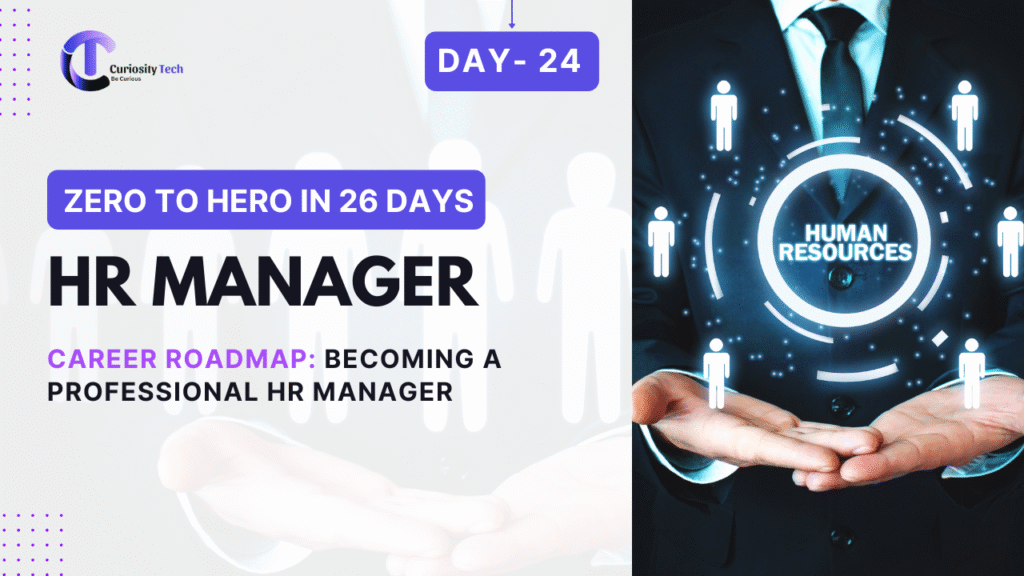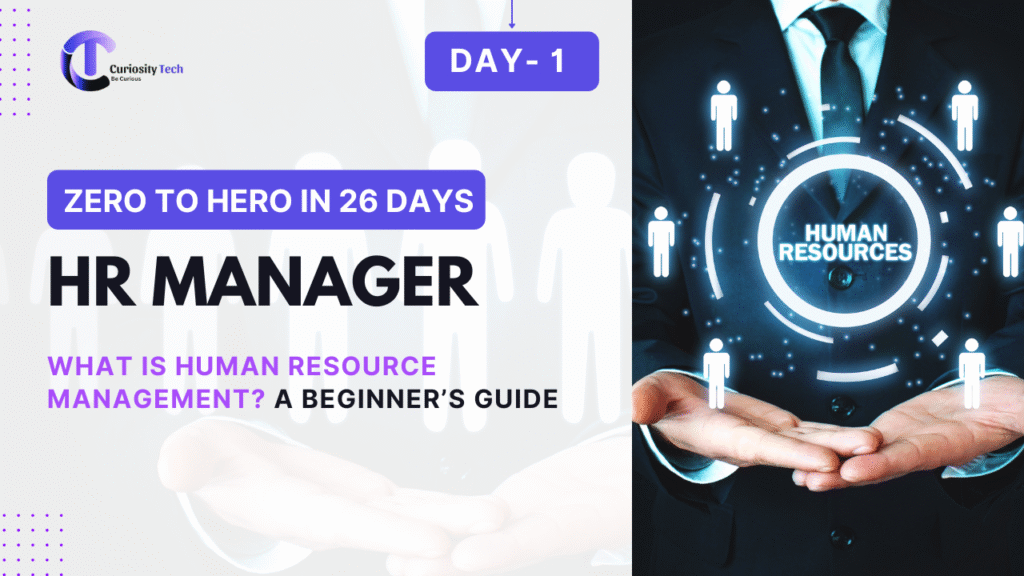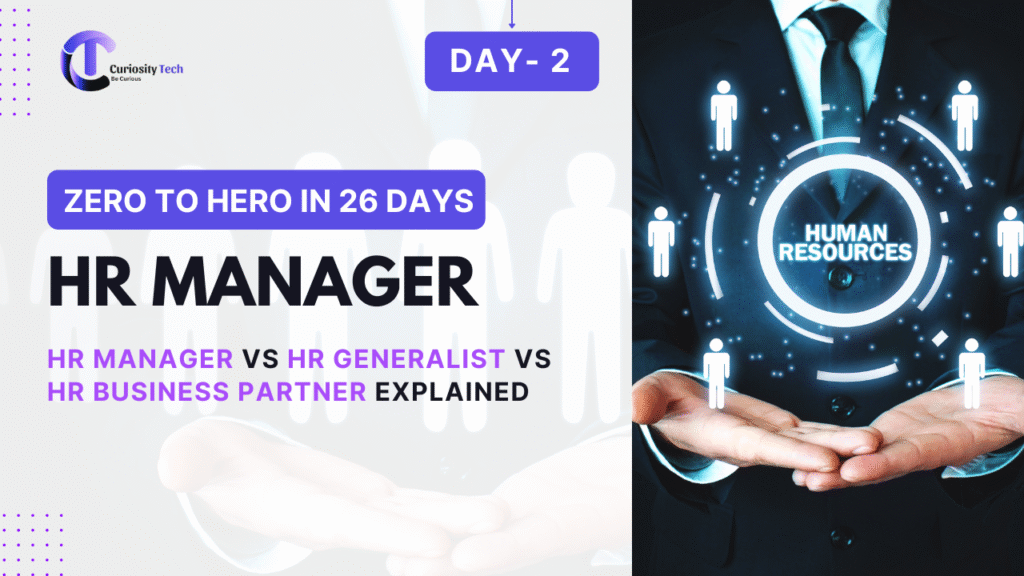Abstract
Becoming a professional HR Manager is not about “falling into HR” — it’s about strategic progression across roles, skills, certifications, and leadership experiences. In 2025, HR is no longer just about payroll or policies; it’s about people strategy, data-driven decisions, technology integration, and organizational culture building.
This roadmap details how individuals can start from entry-level HR roles and grow into professional HR managers, with references to global best practices and the real journey of HR leaders at Curiosity Tech in Nagpur.
1. Why a Roadmap is Essential for HR Careers
- HR is a multi-specialty domain (recruitment, L&D, payroll, analytics, compliance, DEI).
- Random experience creates gaps in expertise.
- A structured roadmap ensures career acceleration and avoids stagnation.
Curiosity Tech uses career roadmaps for all HR staff, ensuring clarity of growth from HR trainee → HR manager → HR business partner.
2. The HR Career Stages: A Journey Map
Stage 1: Entry-Level HR (0–2 years)
- Roles: HR Assistant, HR Trainee, Recruiter.
- Skills to Focus:
- Recruitment basics (sourcing, interviewing).
- Payroll basics.
- HR documentation & compliance.
- Tools: MS Excel, HRMS basics (Zoho People, Darwinbox).
- Certifications: CHRP India, Entry-level HR certifications.
- Curiosity Tech Example: Fresh graduates hired as HR Interns, trained in ATS usage + compliance basics.
Stage 2: Junior HR Executive (2–5 years)
- Roles: HR Executive, HR Coordinator.
- Skills:
- Performance appraisal systems.
- Onboarding & induction.
- Conflict resolution basics.
- Tools: ATS, HRIS, Employee engagement tools.
- Certifications: SHRM-CP, HR Analytics course.
- Milestone: Begin handling one HR function independently.
Stage 3: Mid-Level HR Specialist (5–8 years)
- Roles: HR Specialist, HR Generalist, HR Analyst.
- Skills:
- HR Analytics (predict attrition, measure engagement).
- DEI initiatives.
- Payroll & compliance mastery.
- Training & development planning.
- Tools: Workday, SAP SuccessFactors, advanced HR dashboards.
- Certifications: SHRM-CP, PHR, HR Analytics (XLRI/IIM).
- Milestone: Lead small HR projects, present data-driven insights.
- Curiosity Tech Example: By 2024, Curiosity Tech HR executives built a predictive attrition model → reduced employee turnover by 20%.
Stage 4: Senior HR Professional (8–12 years)
- Roles: HR Manager, HR Business Partner.
- Skills:
- Strategic workforce planning.
- Leadership coaching.
- Crisis & change management.
- Global HR compliance.
- Tools: Advanced HRIS, AI-driven recruitment platforms.
- Certifications: SHRM-SCP, SPHR, CIPD Level 5.
- Milestone: Manage a team of HR executives, align HR goals with business strategy.
Stage 5: Leadership & Beyond (12+ years)
- Roles: Head of HR, CHRO, Talent Strategy Director.
- Skills:
- M&A workforce integration.
- AI & automation adoption in HR.
- Employer branding strategy.
- Negotiating with C-suite.
- Certifications: CIPD Level 7, Global HR leadership certifications.
- Milestone: Represent HR at board-level decision-making.
- Curiosity Tech Example: By 2025, Curiosity Tech’s HR Head became a trusted partner in strategic planning, thanks to SHRM-SCP + HR analytics expertise.
3. Skills That Define a Professional HR Manager
- Technical Skills: HRIS mastery, HR analytics, payroll compliance.
- Behavioral Skills: Empathy, conflict resolution, coaching.
- Strategic Skills: Workforce planning, change management.
- Digital Skills: AI tools, HR dashboards, social media employer branding.
Pro Tip: Always blend soft skills with data literacy — HR without analytics is opinion, HR with analytics is strategy.
4. Career Roadmap Infographic (Description)

5. Certifications Along the Roadmap
- Early Career: CHRP, HR Analytics basics.
- Mid-Career: SHRM-CP, PHR, Payroll certifications.
- Senior Career: SHRM-SCP, SPHR, CIPD.
- Leadership: CIPD Level 7, Global HR leadership.
6. Challenges HR Professionals Face on the Journey
- Burnout from transactional tasks → Solution: Automate with HRIS.
- Limited exposure in Tier-2 cities → Solution: Online certifications + LinkedIn networking.
- Balancing specialization vs generalization → Solution: Choose role-based certifications.
- Keeping up with HR tech → Solution: Upskill yearly.
Curiosity Tech solved this by setting up “HR Fridays” learning sessions, where the HR team shares case studies, tech updates, and compliance news.
7. Practical Checklist – To Become a Professional HR Manager
- Define long-term HR career goal (Talent, Analytics, Generalist, Leadership).
- Pursue 1 certification every 2–3 years.
- Build strong digital profile (LinkedIn, curiositytech.in HR updates).
- Gain exposure to multiple HR functions (recruitment, L&D, payroll).
- Mentor juniors to grow leadership capacity.

8. Future Outlook (2025–2030)
- AI in HR – HR managers will act as AI supervisors for automated HR decisions.
- Global Virtual Workplaces – More remote-first HR leadership.
- Micro-certifications – Continuous learning via small, stackable credentials.
- Strategic HR at Board Level – HR leaders as co-pilots of business strategy.
9. Conclusion
Becoming a professional HR Manager is not a one-time achievement, but a progressive journey. From handling recruitment forms to influencing boardroom strategies, the growth path demands learning, certifications, exposure, and leadership mindset.
Curiosity Tech’s HR team’s journey — from local HR interns in Nagpur to globally certified professionals with strategic influence — proves that with the right roadmap, anyone can build a strong HR career irrespective of geography.
The question every HR aspirant should ask today is: “Where am I on this roadmap, and what’s my next step?”



